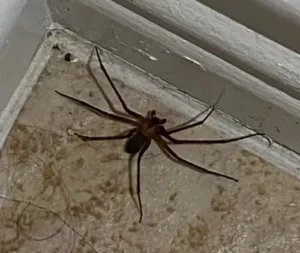Brown Recluse Spiders

The well-known brown recluse spider(Loxosceles reclusa) is a highly venomous arachnid and has a bite that can be dangerous to humans. It is a common spider in Texas, and it can be found in many houses, barns, and garages. Whenever a person is bitten by a brown recluse spider, they usually feel the pain within minutes or hours. The bite will cause a small wound that will get redder and redder as the hour’s pass. The venom produced by the brown recluse spider is harmful to humans because it destroys red blood cells and causes tissue damage in the area around the bite.
In homes, the brown recluse likes to hide in boxes, shoes, and other dark places where it can stay hidden. The brown recluse spider is 6-20mm in size and has a violin-shaped marking on its back. It has 8 eyes and two body parts, which are the head and the abdomen. The brown recluses color can vary from light tan to dark brown.
Having a professional pest control technician spray the house and container areas with insecticide will prevent these spiders from invading your home. Professional pest control can also spray for any other insects, which will take away the food source for the brown recluse. This will cause the spider to leave its hiding areas and causing it to get into the pesticide residual. The brown recluse will also be killed by the insecticide once it comes in contact with it.
The brown recluse spider might be found in dark, undisturbed areas such as…
Attics * Cellars * Closets * Damp basements * Garages * Tool sheds
These spiders prefer to live in dry, undisturbed areas. They are not usually found around sinks and bathtubs or near food storage areas. Houses surrounding wooded areas are more likely to be infested with brown recluse spiders.
Most people will never be bitten by a brown recluse spider, but that can quickly change if you have one of these spiders in your home. Luper Industries Pest Control can help you eliminate these spiders and prevent more from entering your home. Not all brown recluse bites result in significant injury; however, some can be life-threatening.